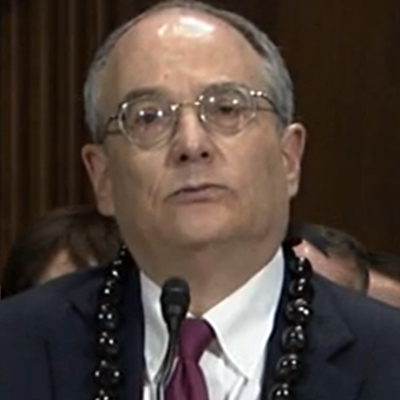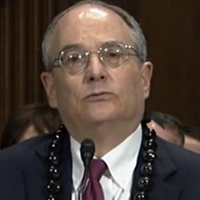
U.S. Ninth Circuit Court of Appeals Judge Mark J. Bennett
SAN FRANCISCO - Los Angeles' public school district and other government agencies can force workers to receive Covid shots as a condition of keeping their jobs, even if the "vaccines" don't actually work to prevent anyone from becoming infected with the virus or transmitting the virus to others, a federal appeals court has ruled.
On July 31, a full panel of the U.S. Ninth Circuit Court of Appeals overturned an earlier ruling from their colleagues, declaring now that the L.A. Unified School District (LAUSD) didn't violate the constitutional rights of workers who were fired after they refused to get Covid shots.
In the ruling, the court's majority refused to consider evidence that the so-called Covid vaccines actually immunized anyone against contracting or spreading the virus that caused Covid-19.
Instead, the majority said it mattered only that the government declared the shots were "effective in preventing and spreading the disease."
They grounded the ruling in the longstanding U.S. Supreme Court decision known as Jacobson v Massachusetts. That decision, which authorized Massachusetts public health officials to force vaccine skeptics to receive smallpox inoculations in 1905, has been used by governments ever since to enforce vaccine mandates.
"Jacobson holds that the constitutionality of a vaccine mandate, like the Policy here, turns on what reasonable legislative and executive decisionmakers could have rationally concluded about whether a vaccine protects the public’s health and safety, not whether a vaccine actually provides immunity to or prevents transmission of a disease," the majority wrote.
"Whether a vaccine protects the public’s health and safety is committed to policymakers, not a court or a jury. Further, alleged scientific uncertainty over a vaccine’s efficacy is irrelevant under Jacobson. Jacobson simply does not allow debate in the courts over whether a mandated vaccine prevents the spread of disease. Jacobson makes clear that it is up to the political branches, within the parameters of rational basis review, to decide whether a vaccine effectively protects public health and safety," the majority wrote.
The majority decision was authored by Ninth Circuit Judge Mark J. Bennett. He was joined in the majority by Ninth Circuit Chief Judge Mary H. Murguia and circuit judges Kim McLane Wardlaw, Consuelo M. Callahan, Bridget S. Bade, Danielle J. Forrest, Salvador Mendoza Jr. and Roopali H. Desai.
Bennett was appointed by President Donald Trump during his first term in office.
Circuit Judges Kenneth K. Lee and Daniel P. Collins lodged a partial dissent.
Circuit Judge John B. Owens also filed a dissent, though for different reasons.
The case had landed before the so-called en banc 11-judge panel as the latest step in the court fight over the LAUSD Covid shot mandate.
The legal challenge was launched in 2021 by a group known as California Educators for Medical Freedom. They were joined in the action by named individual plaintiffs Jeffrey Fuentes, Sandra Garcia, Hovhannes Saponghian and Norma Brambila.
They were later joined in the action by the Health Freedom Defense Fund, an organization affiliated with current U.S. Health and Human Services Secretary Robert F. Kennedy, a noted vaccine skeptic.
The lawsuit accused LAUSD of violating its workers' "fundamental rights to refuse medical treatment" by forcing them to receive a Covid shot, despite their objections and requests for exemptions, or face termination.
The lawsuit seeks a court order declaring the LAUSD - and, by extension, other school districts and public employers in California and elsewhere - had violated the workers' constitutional rights to bodily integrity.
A federal judge dismissed the action, relying on the Jacobson decision to declare the school district can constitutionally impose the mandate and fire workers who refuse.
The fired workers appealed to the Ninth Circuit, where the LAUSD attempted to argue the appeal should be dismissed, because the LAUSD had ended the mandate before the appeals court could hear it.
A three-judge panel, however, rejected that argument, blasting the LAUSD for attempting to "tactically manipulate" federal courts by rescinding and reinstating the mandate several times in a bid to win dismissal on the grounds that the case was moot.
In a 2-1 decision, however, the panel's majority opinion, written by Judge Ryan D. Nelson and joined by Judge Collins, went further. They agreed the demonstrated ineffectiveness of Covid shots to prevent infection and transmission of the Covid virus may place the shots in a different medical category than "traditional vaccines" which prevent infection.
They said the holdings of the Jacobson decision shouldn't apply to prevent the lawsuit in this case, because the school district has yet to produce evidence to back their contentions that the Covid vaccines "effectively 'prevent the spread' of COVID-19."
Following that ruling, however, other judges among the Ninth Circuit's judicial roster tossed out the decision, saying they believed their colleagues had erred. The court directed the case to be re-argued en banc before a full panel of 11 judges.
In the new ruling, the Ninth Circuit en banc majority said they believed the LAUSD had been "more than reasonable" to enforce the mandate.
Even if the Covid shots didn't actually prevent anyone from contracting or spreading the illness, they said, the "COVID-19 vaccines 'lessen the severity of symptoms for individuals who receive them,'" which is sufficient to force everyone employed by the district to get the shots.
"... The LAUSD could have reasonably concluded (based on the claims of public health officials) that COVID-19 vaccines would protect the health and safety of its students and employees," the majority wrote.
They added: "We reject Plaintiffs' attempt to limit Jacobson to only those vaccines that prevent the spread of a disease and provide immunity."
In dissent, Judge Owens declared his colleagues had been wrong to not allow the case to be ended as moot, because LAUSD had ended the Covid vaccine mandate two years ago and has indicated no intention to revive it.
In their dissent, Lee and Collins said the majority was wrong to not consider evidence concerning the actual effectiveness of the Covid shots and said the ruling creates a new constitutionally precarious line in the debate over medical freedom.
They said the Supreme Court's Jacobson decision was about inoculations that did more than just "lessen the severity of symptoms" of a disease in those who received the shot.
"The entire thrust of Jacobson is that 'public health and public safety' means protecting the mass public from the spread of smallpox," Lee wrote.
"... If we accept the majority's holding that a state can impose a vaccine mandate just to 'lessen the severity of symptoms' of sick persons - without considering whether it lessens transmission and contraction of this disease - then we are opening the door for compulsory medical treatment against people's wishes.
"Vaccines, by definition, build immunity and prevent transmission and contraction of an infectious disease, but we risk blurring the line between vaccines and medical treatment if vaccines are defined as anything that lessens symptoms."


